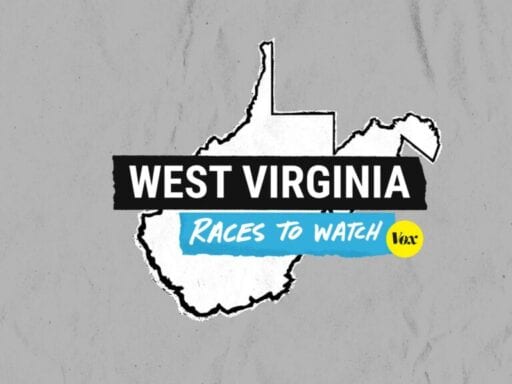Democrats are long shots in the increasingly red state, but they aren’t entirely shut out of power.
Once upon a time, West Virginia was a Democratic stronghold. It was one of just a few states that preferred President Jimmy Carter over challenger Ronald Reagan in the 1980 election, and the state had two Democratic senators as recently as 2015.
But those days are long gone.
On Tuesday, Democrats are set to choose which of their candidates will try to retake two positions currently held by Republicans: the governor’s mansion, and one of the state’s US Senate seats. West Virginia Gov. Jim Justice — who switched from the Democratic Party to the Republican Party in 2017, at a time when Democrats in most of the country were gearing up for major electoral victories in the next midterm election — will face a primary of his own.
Whichever Democrat wins the Senate primary will face a steep uphill battle to unseat Republican Sen. Shelley Moore Capito this fall. President Donald Trump crushed Democrat Hillary Clinton by more than 40 points in 2016. It is a testament to the political skill of Sen. Joe Manchin, a right-leaning Democrat who has held statewide office for nearly two decades and is not up for reelection this year, that his political career remains alive even as his state transforms into one of the reddest in the nation.
Tuesday’s West Virginia primary won’t just reveal much about how Democrats hope to weather the challenges facing them in the Mountain State, however. It will also reshape the state’s highest court.
Three of the state’s five state Supreme Court seats are up for grabs
Judicial elections are always a fraught enterprise. Most voters who aren’t practicing attorneys know little about the judges in their state. And judges are supposed to follow the law without partisan favor, rather than being loyal to the constituencies that got them their job.
In West Virginia, state Supreme Court elections are especially worrisome. In 2004, coal baron Don Blankenship essentially bought a seat on the state Supreme Court for $3 million. Blankenship spent that much to elect his preferred candidate to the state’s highest court, after which the justice went on to strike down a $50 million verdict against Blankenship’s company. (The US Supreme Court later ruled that the justice should have recused himself, effectively requiring the state Supreme Court to rehear the case.)
Moreover, in 2016 the state made its judicial races “nonpartisan.” In practice, that doesn’t mean that political parties are indifferent about who wins this election. It simply means that the ballot will not inform voters which party each candidate prefers.
But because these races are nominally nonpartisan, there is no primary election to choose each party’s candidate. The winners of Tuesday’s races will join the Supreme Court of Appeals of West Virginia, the state’s highest court. It is unusual for so many seats to be up for grabs at once, but it’s the result of a scandal that forced three justices to resign in 2018 (the details of this scandal, which include a $32,000 couch, can be found here).
The state’s Republican Party endorsed three candidates: incumbent Justice Tim Armstead, Fifth Judicial Circuit Judge Lora Dyer, and Putnam County Assistant Prosecuting Attorney Kris Raynes. The Republican State Leadership Committee’s Judicial Fairness Initiative has spent hundreds of thousands of dollars to elect these candidates. Meanwhile, a rival group called ReSet West Virginia has spent similar sums of money supporting a different ticket of candidates: incumbent Justice John Hutchison, former Justice Richard Neely, and 13th Judicial Circuit Judge Joanna Tabit.
Both parties will pick gubernatorial nominees
Incumbent Gov. Jim Justice, a billionaire former Democrat who switched to the GOP after he took office, attracted two reasonably serious challengers in the state’s Republican primary. But neither one seems to have caught fire. A recent poll showed Justice winning his primary with over 53 percent of the vote.
Meanwhile, the Democratic primary contest resembles, at least on the surface, the cultural divide between former Vice President Joe Biden and Sen. Bernie Sanders (I-VT), the top two contenders for the Democratic presidential nomination. Kanawha County Commissioner Ben Salango, whom Manchin endorsed, plays the role of the establishment favorite. Salango’s strongest opponent, meanwhile, is community organizer Stephen Smith.
A recent poll showed Salango winning with just over 30 percent of the vote, while Smith received a little more than 27 percent support. The poll also found more than a quarter of the electorate undecided, with three long-shot candidates winning about 14 percent of the vote in total.
Democrats will pick a US Senate candidate
The Democratic primary also features a three-way race between former state Sen. Richard Ojeda, former South Charleston Mayor Richie Robb, and activist Paula Jean Swearengin for the party’s US Senate nomination.
Whoever prevails, however, is likely to face a very difficult race. Capito, the incumbent Republican, clobbered her Democratic opponent by nearly 28 points in 2014.
Support Vox’s explanatory journalism
Every day at Vox, we aim to answer your most important questions and provide you, and our audience around the world, with information that has the power to save lives. Our mission has never been more vital than it is in this moment: to empower you through understanding. Vox’s work is reaching more people than ever, but our distinctive brand of explanatory journalism takes resources — particularly during a pandemic and an economic downturn. Your financial contribution will not constitute a donation, but it will enable our staff to continue to offer free articles, videos, and podcasts at the quality and volume that this moment requires. Please consider making a contribution to Vox today.
Author: Ian Millhiser
Read More



